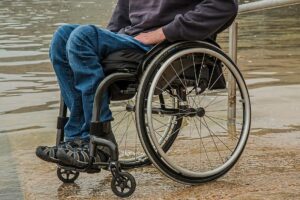Some states are less than ideal to retire in due to multiple factors like taxation rates, accessibility to health care, and personal factors. And when planning for retirement, it’s essential to be aware of which states retirees must steer clear of.
The worst states to retire in for disabled individuals include Oklahoma, Montana, Hawaii, Maine, Connecticut, Alaska, and New Jersey. Most of these states have a high cost of living, low accessibility to medical care, or do not have an infrastructure that is designed for disabled people.
Continue reading below as we describe in more detail why these are the worst states for disabled individuals to retire in.
Tips for Choosing Your Retirement State
When deciding which state to retire in, it is recommended to consider the following factors:
Taxation Rate
The first thing to look into is the state’s tax environment. This is a significant factor for most disabled people when deciding which state to live in. But that’s not all. It’s important to remember that many places with lower income taxes have higher property taxes to make up for it.
If you own a home or want to own a home, make sure you know how property taxes work in the state you want to move to.
The property tax rates in different parts of the country can either be a significant source of savings or a significant annual expense. You still have to pay property taxes, even if you’ve paid off your mortgage. So, it’s important to determine whether those costs are reasonable.
Given that 91% of Americans don’t know that Medicare premiums are tax-deductible, it is good to take the time to learn more about how moving to a different state will affect your taxes.
Availability of Medical Care
Having access to good medical care is very important for disabled people. If you want to retire comfortably, it’s essential to have quick access to both routine and emergency medical care, no matter where you live.
In some cases, disabled patients forego necessary medical care because they cannot afford to travel for hours to see a specialist, a cost that is often overlooked.
Knowing if you’ll be covered by insurance is as important as knowing where you’ll obtain your medical treatments. If you already have a medical condition, you will need more medical care when you retire. Therefore, the price of health insurance should also be given serious thought.
For instance, if you want to retire early, you might not be able to get Medicare and will need to get health insurance until you turn 65.
The average price of health insurance varies from state to state. If the cost of health insurance in your state is too high, it is recommended to look for other options.
Proximity to Loved Ones
Being able to spend time with their loved ones is important for many disabled people. If your family or friends live in different parts of the country, you might want to choose a retirement location that is in close proximity to everyone, so it’s easy to visit them.
Many people prepare for retirement by saving as much as possible. However, not spending enough time with loved ones is a common regret among people who retire.
Your loved ones (parents, grandparents, kids, friends, etc.) should be your priority. Where do they reside? How frequently would you like to see them? Considering these questions, it might make sense to live in the same state as your close family and friends or close enough that you can visit them.
Personal Preferences
Think carefully about how you prefer to spend your time. Do you enjoy experiencing nature? Do you thrive off the hustle and bustle of city life? Do you yearn for a secluded existence in the midst of nature? Simply put, you should pick a place that has an environment in which you feel comfortable.
You’ll enjoy retirement more if you settle down in a place where you can stay busy doing the things that matter to you. Consult retirement planners and Medicare specialists for assistance in developing a retirement strategy that meets your unique needs.
The Worst States to Retire in For Disabled Individuals
The following states are the worst to retire in for disabled individuals based on factors like cost of living, taxation rate, infrastructure, and accessibility to medical care:
7. New Jersey

New Jersey is not the best choice for retirement for a number of different reasons. To begin with, the state as a whole has a significantly higher crime rate than other states. Furthermore, this state is costly to live in. There are taxes at both the state and local levels in addition to the federal one. In addition to state taxes, you must also pay taxes for the town or city where you live. These can be anything from a minor annoyance to a financial disaster, depending on where you live.
Even if that doesn’t scare you off, think about the following. There is a lot of traffic, and it frequently grinds to a halt. That means you can’t get where you need to go in a reasonable amount of time, no matter what time of day you travel.
Food, gas, clothing, and everything else are all more expensive to buy there. Last but not least, you’ll have to pay more for home insurance because of the weather there. Also, this is very important if you want to retire near the beach. If the house you want to retire to is in a certain area, you might even have trouble getting anyone to insure it.
6. Alaska
Many people wonder if Alaska is a good place to live. Unfortunately, there are several problems with choosing to retire in Alaska.
The first and major problem is that the weather is far from ideal. This may not be on your list of priorities, but if you have arthritis or some other health condition, it’s possible that by the time you’re ready to retire, you’ll find it more difficult to adapt to different weather than you do now.
There are, of course, additional concerns. Once again, the cost of living in Alaska is higher than in the rest of the country. Also, keep in mind that unless you live in one of the very few big cities, getting basic things like food and cleaning supplies can be a huge hassle.
For those who live on the edges of cities or in smaller towns, having their goods flown in once a month is often the only option due to infrequent supply. But this option, too, requires a hefty investment. In addition, those supplies are the only ones available until the next flight becomes available.
Think about the difficulty of storing milk, meat, and other perishables for a month. It does not suit many people to spend their golden years in Alaska, where they’ll have to face various problems at every turn. Instead, it is recommended to visit this place and take pictures of wildlife rather than actually think about living there full-time.
5. Connecticut

Connecticut would be among the top retirement destinations if it did not have a few major problems that are impossible to ignore for disabled people. For example, taxes in this state are some of the highest in the country, and there are no exceptions for retired people, people receiving Social Security benefits or Medicare.
You’ll have to spend your fixed income on taxes that are likely to be very high. This makes Connecticut a really expensive place to live, especially if your only source of income is a retirement benefit.
Similarly, there is far too much traffic in Connecticut. The number of people living there is much higher than the amount of space that is available. The population in Connecticut is in a state of constant boom, but unfortunately, no attempts have been made to improve the infrastructure in order to accommodate this growth.
This might force you to rethink your retirement plans unless you plan to settle down in a major city on a piece of land conveniently located near a hospital, a grocery store, and various activities.
4. Maine
Maine is a beautiful state, but it also has some problems. Property values have remained relatively high in this state. The quality of healthcare is among the best, but these advantages do not come cheap. You’ll be paying a lot of money in taxes if you decide to retire there. It’s also essential to remember that you’ll need good health insurance if you want to use any of those expensive medical facilities.
It might also be challenging for disabled people who retire to Maine to be able to get doctor’s appointments for months. This is because the number of healthcare professionals as compared to the population is relatively low.
As was already said, the healthcare system in Maine is among the finest in the nation. It is for this reason that people from far away have to make the trip to Maine for treatment of major illnesses when they don’t have access to it where they reside.
But this also means that, as a state resident, you will have to compete with a large number of other people for a limited number of appointment slots. As a result, waiting for an appointment can take as long as six months.
For disabled older people on fixed incomes, having to wait six months to see a good doctor is simply impossible.
3. Hawaii
Hawaii is, without any doubt, a stunning place. The people are accommodating, the weather is usually great, and there are many things to do to keep oneself busy. What’s wrong with living there if all of this is true?
Again, the issue is the price tag. This is, sadly, the situation with a large number of states, and Hawaii is no exception.
In general, the cost of living is higher in Hawaii than in most other states. This means you will be spending a significant amount of your income on grocery bills and other costs.
The property prices and property taxes will also cost you a lot more than you can expect in other states. In the absence of a huge emergency fund, it’s easy to get into serious financial difficulty without much warning.
2. Montana
Montana is not as densely populated as some of the other states on this list. It is for this reason that they name it “Big Sky Country.”
There’s no denying the fact that this is a good place to retire for some, but it’s not the best option for everyone. You probably won’t be as content here as you could be surrounded by your loved ones, especially as someone who may require regular human assistance.
1. Oklahoma

Oklahoma has a state income tax and plenty of toll highways. The infrastructure is also less-than-ideal, and many drivers have to stop midway on their journey to give their vehicles a rest and inspect for any damages.
It’s also worth noting that the state has a few budget problems, which have an impact on everything from healthcare to education.
This state also lacks the infrastructure for good medical care. Like nearly every other state in the US, there is a severe lack of high-quality healthcare options, and those that do exist are primarily accessible to the wealthy.
Similarly, the schools are consistently rated as some of the worst in the nation. As a retiree, that probably isn’t a top priority for you, but it says a lot about the state’s administration.
Advocates of the state point to its low cost of living as evidence that it is an excellent retirement destination. But there is a catch when it comes to the low cost of living: residents receive very little in return.
Conclusion
Disabled individuals must be extra careful when choosing where to spend the rest of their lives after their working years. They have to consider many factors to ensure those years will be spent comfortably. This is why we created the ultimate list of states that disabled people must steer clear of when thinking of retirement.





